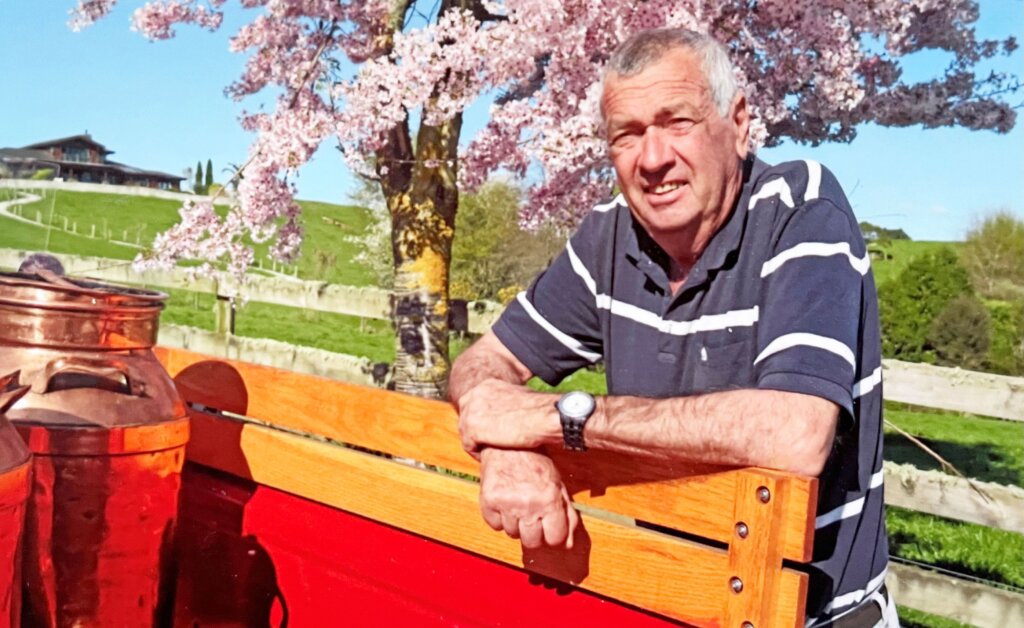
Colin Pinkerton
Just a few weeks ago, Colin Pinkerton shared a sentiment with his son Nigel… one that showed his lifetime of commitment to all he wanted to achieve.
While walking near Pirongia, Nigel asked if his father would do anything differently given the opportunity. The 73-year-old said he had no regrets and added, “well, if I hadn’t been a farmer, I guess I would have just ended up driving trucks or something”.
Colin became a farmer, and a damned good one at that. He drove all manner of vehicles, but his passion was for cars and the restoration of old agricultural machinery. He was a loving family man, a global adventurer with a philanthropic heart, a man noted for frugality, one not above telling his kids to fudge their age to secure the kids’ meals when they went out. Yet for all those lessons around the importance of ‘counting the pennies’, his family, friends, and even complete strangers, testified to his expansive generosity.
Colin was born in Hamilton on January 26, 1950, the fourth child to a family who farmed in Te Rapa. His passing last month came just seven months after that of Lynn, his wife of almost 53 years.
Theirs was an enduring love that started in their 19th year when Lynn arrived to board with Colin’s family. She was a Manawatu girl bent on teaching, and Colin, who hadn’t the best relationship with formal schooling, gave her a wide berth until he found the courage to ask her out.
His winning line, “do all schoolteachers have hands as soft as yours?” clearly worked and the pair married at 20, going on to have four children and nine grandchildren before 2023 took them both.
Colin left school at 15 to work on the family farm. The plucky lad registered as an independent agricultural contractor at just 16, and at 18 he got his heavy-duty licence and started driving trucks for Northern Steel on top of milking cows and hay contracting. In the same year, he went into a Ford dealership and tried to buy a new car. Met with laughter, he was turned down because he had no overseas funds.
The newly-weds bought their first dairy unit at age 24 and in 1981, Colin scooped the Young Farmer of the Year title in recognition of the way they turned a profit from what was considered a dubious block.
Eldest son Michael, who delivered a compelling eulogy at Colin’s funeral last week at the Te Awamutu Bible Chapel, spoke of his father’s legacy. A recent discovery of badges earned through early Boy’s Brigade alliances was perhaps a life marker. One of them was the Brigade’s highest honour, the Queen’s Badge presented to Colin by the then Governor General.
“He achieved great things through hard work and connecting with others,” Michael said, recounting the many groups that were hosted on farm to thank them for helping during those ‘first naïve years’. He was a Dairy Farmers Board representative, on school boards and the Te Awamutu Community Board, and involved with the Gracelands Group in Te Awamutu. Further afield he was part of the Heifers Training Scheme in Uganda and helped Habitat for Humanity build community houses in Nepal.
Until recently, his award-winning Iron Park Museum, replete with vintage farm machinery and collectables, charmed those who visited the Pirongia Rd property on which it stood.
Three other of Colin and Lynn’s children – Raewyn, Nigel and Ruth – spoke to their father’s humour, recalling a childhood filled with water fights, hay-bale tunnels, tree houses and whiffy Christmas trees brought home via the paddock.
Colin’s creativity led him to building an ‘animal train’ for the grandies, and later, to a keen interest in dried flower arranging.
Using his own words, Colin wrote of the twin privileges of being loved by a ‘beautiful woman and wonderful family’, and that of being a steward of the land, leaving it in better condition than he found it.









